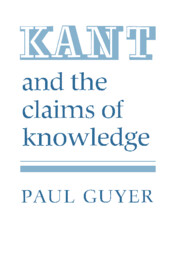Book contents
- Frontmatter
- Contents
- Acknowledgments
- Note on sources
- Introduction
- Part I Kant's early view
- Part II The transcendental deduction from 1781 to 1787
- Part III The principles of empirical knowledge
- 6 The schematism and system of principles
- 7 Axioms and anticipations
- 8 The general principle of the analogies
- 9 The first analogy: substance
- 10 The second analogy: causation
- 11 The third analogy: interaction
- Part IV The refutation of idealism
- Part V Transcendental idealism
- Afterword
- Notes
- Index of passages cited
- General index
11 - The third analogy: interaction
Published online by Cambridge University Press: 09 March 2010
- Frontmatter
- Contents
- Acknowledgments
- Note on sources
- Introduction
- Part I Kant's early view
- Part II The transcendental deduction from 1781 to 1787
- Part III The principles of empirical knowledge
- 6 The schematism and system of principles
- 7 Axioms and anticipations
- 8 The general principle of the analogies
- 9 The first analogy: substance
- 10 The second analogy: causation
- 11 The third analogy: interaction
- Part IV The refutation of idealism
- Part V Transcendental idealism
- Afterword
- Notes
- Index of passages cited
- General index
Summary
The argument of the third analogy can be expounded briefly. This does not reflect its lack of importance in Kant's transcendental theory of experience, however. Quite the contrary: Although many recent commentators have given short shrift to this argument,1 it is necessary to complete the argument of the first analogy and the interdependent theory of the analogies as a whole. More broadly, the third analogy is of fundamental importance for Kant's picture of physical science, because it is clearly intended to demonstrate that in the absence of direct perceptions of positions in absolute space (up to this point, of course, Kant has emphasized only the implications of the impossibility of any direct perception of temporal positions) spatial positions can be empirically determined only within the context of a system of complete interaction among the occupants of those positions. Kant thus takes the opportunity offered by a discussion of the necessary conditions for determinate judgment about the third “mode” of time, simultaneity (a temporal relation often assumed to be directly perceivable, and thus to have no special conditions of possibility at all), to sketch (or barely sketch) an argument for the fundamentally Newtonian, and profoundly anti-Leibnizian, thesis of universal interaction among numerically distinct substances, resting his argument on nothing other than the equally basic Leibnizian premise that the perception of spatial position must always be relative rather than absolute. Thus, the third analogy must be seen as the culmination of Kant's lifelong effort to provide foundations for Newtonian science, while rejecting both Newton's metaphysics of absolute space independent of the subject of experience and Leibniz's metaphysics of utterly independent rather than completely interacting substances.
- Type
- Chapter
- Information
- Kant and the Claims of Knowledge , pp. 267 - 276Publisher: Cambridge University PressPrint publication year: 1987



